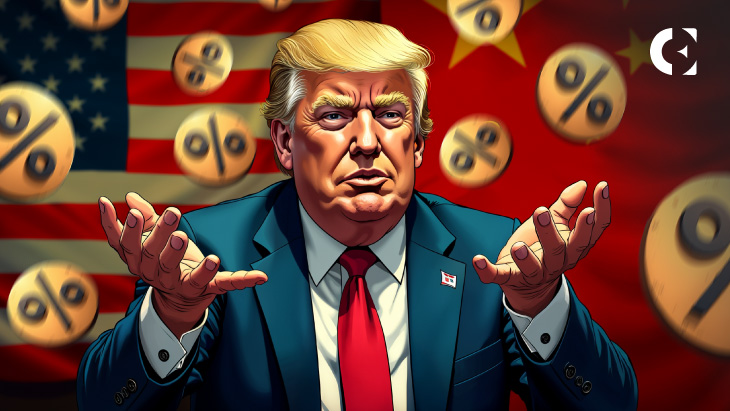U.S. Blocks Nvidia Chips to China—What Happens to AI Stocks?

U.S. blocks Nvidia chips to China in what appears to be a major escalation of tech tensions between Washington and Beijing. The export ban, which was just announced, specifically targets Nvidia’s H20 chips, and has already sent AI stocks tumbling, leaving many investors wondering about the long-term investment strategies in this sector.
Also Read: Pi Coin April 2025: Price to Jump 230% This Month? $2 Peak In Sight
How The Nvidia Chip Ban Impacts AI Stocks, China, And Investors

The U.S. government recently informed Nvidia that it would actually require export licenses “for the indefinite future” to sell H20 chips to China. This China export ban marks a significant intensification in the ongoing chip war between the world’s largest economies, and has caught many analysts by surprise.
Nvidia Takes $5.5 Billion Hit
Nvidia will record a substantial $5.5 billion charge in its fiscal 2026 first-quarter due to the China export ban. U.S. blocks Nvidia chips specifically designed for Chinese markets, creating immediate and rather severe financial consequences for the tech giant.
According to Morningstar Research:
“China has shrunk to about 10% of Nvidia’s revenue from 20%, and we now expect it to go to close to zero.”
The Nvidia charge relates to “H20 products for inventory, purchase commitments, and related reserves,” according to the company’s regulatory filing. This news sent Nvidia shares down approximately 6% in premarket trading on Wednesday, and also affected other companies in the sector.
Broader AI Stock Market Impact
The chip war impact extends well beyond just Nvidia alone. AMD also faces similar restrictions on its MI308 chip, with the U.S. Commerce Department issuing new export licensing requirements right at this moment.
A spokesperson for the U.S. Commerce Department stated that the administration was issuing new export licensing requirements for the Nvidia H20; a chip from Advanced Micro Devices, the MI308; and their equivalents.
China’s Ministry of Commerce has also responded with its own export controls on AMD’s AI chips in the country, further complicating the situation for American semiconductor companies that are currently operating in the region.
Also Read: Shiba Inu Vs. Dogecoin: Which Can Turn $1000 To $1 Million First?
What This Means For Investors
The U.S. blocks Nvidia chips to address concerns that these products might be “used in, or diverted to, a supercomputer in China,” according to the company’s filing. This action signals that the ongoing tech containment policies from the Trump administration will likely continue for the foreseeable future.
For AI market investors, the China export ban necessitates a complete reassessment of technology investments with Chinese exposure. The chip war impact will likely force semiconductor companies to create separate supply chains for different markets, which could lead to additional costs and operational complexities.
Future Outlook
The Nvidia charge of $5.5 billion really highlights the immediate financial consequences of these restrictions. Over the longer term, U.S.-China tech tensions seem likely to persist or even intensify as both nations compete for technological dominance.
Also Read: Binance Coin Vs TRON: Which Comes Out On Top By April-End?
Nvidia noted in its regulatory filing:
“The USG indicated that the license requirement addresses the risk that the covered products may be used in, or diverted to, a supercomputer in China.”
AI stocks face continued volatility as these geopolitical factors reshape the semiconductor landscape. For Nvidia specifically, the challenge will be adapting its business strategy to compensate for potentially permanent loss of the Chinese market access.
The long-term trajectory of AI market investments will depend on how effectively companies navigate these new restrictions while continuing to innovate in permitted markets around the world.
Read More

Ford Suspends Shipments to China Amid US Trade War
U.S. Blocks Nvidia Chips to China—What Happens to AI Stocks?

U.S. blocks Nvidia chips to China in what appears to be a major escalation of tech tensions between Washington and Beijing. The export ban, which was just announced, specifically targets Nvidia’s H20 chips, and has already sent AI stocks tumbling, leaving many investors wondering about the long-term investment strategies in this sector.
Also Read: Pi Coin April 2025: Price to Jump 230% This Month? $2 Peak In Sight
How The Nvidia Chip Ban Impacts AI Stocks, China, And Investors

The U.S. government recently informed Nvidia that it would actually require export licenses “for the indefinite future” to sell H20 chips to China. This China export ban marks a significant intensification in the ongoing chip war between the world’s largest economies, and has caught many analysts by surprise.
Nvidia Takes $5.5 Billion Hit
Nvidia will record a substantial $5.5 billion charge in its fiscal 2026 first-quarter due to the China export ban. U.S. blocks Nvidia chips specifically designed for Chinese markets, creating immediate and rather severe financial consequences for the tech giant.
According to Morningstar Research:
“China has shrunk to about 10% of Nvidia’s revenue from 20%, and we now expect it to go to close to zero.”
The Nvidia charge relates to “H20 products for inventory, purchase commitments, and related reserves,” according to the company’s regulatory filing. This news sent Nvidia shares down approximately 6% in premarket trading on Wednesday, and also affected other companies in the sector.
Broader AI Stock Market Impact
The chip war impact extends well beyond just Nvidia alone. AMD also faces similar restrictions on its MI308 chip, with the U.S. Commerce Department issuing new export licensing requirements right at this moment.
A spokesperson for the U.S. Commerce Department stated that the administration was issuing new export licensing requirements for the Nvidia H20; a chip from Advanced Micro Devices, the MI308; and their equivalents.
China’s Ministry of Commerce has also responded with its own export controls on AMD’s AI chips in the country, further complicating the situation for American semiconductor companies that are currently operating in the region.
Also Read: Shiba Inu Vs. Dogecoin: Which Can Turn $1000 To $1 Million First?
What This Means For Investors
The U.S. blocks Nvidia chips to address concerns that these products might be “used in, or diverted to, a supercomputer in China,” according to the company’s filing. This action signals that the ongoing tech containment policies from the Trump administration will likely continue for the foreseeable future.
For AI market investors, the China export ban necessitates a complete reassessment of technology investments with Chinese exposure. The chip war impact will likely force semiconductor companies to create separate supply chains for different markets, which could lead to additional costs and operational complexities.
Future Outlook
The Nvidia charge of $5.5 billion really highlights the immediate financial consequences of these restrictions. Over the longer term, U.S.-China tech tensions seem likely to persist or even intensify as both nations compete for technological dominance.
Also Read: Binance Coin Vs TRON: Which Comes Out On Top By April-End?
Nvidia noted in its regulatory filing:
“The USG indicated that the license requirement addresses the risk that the covered products may be used in, or diverted to, a supercomputer in China.”
AI stocks face continued volatility as these geopolitical factors reshape the semiconductor landscape. For Nvidia specifically, the challenge will be adapting its business strategy to compensate for potentially permanent loss of the Chinese market access.
The long-term trajectory of AI market investments will depend on how effectively companies navigate these new restrictions while continuing to innovate in permitted markets around the world.
Read More

